Environmental Benefits Of Healthy Lawns
It's worth noting that lawns have more to offer than just visual appeal. Maintaining a vibrant and thriving lawn can positively impact the environment. Unlike hard surfaces such as concrete, asphalt, or wood, the grass in your lawn can provide various environmental benefits.
However, maintaining a healthy lawn can be time-consuming and challenging. It is where a robot mower comes into play. Investing in a robot mower ensures your lawn is maintained regularly without manual labor.
By keeping your lawn healthy, you can also help the environment. Here are some benefits a healthy lawn can offer:
Improve Soil Structure
When soil lacks proper structure, it becomes compacted, hindering water penetration. It is especially worrying in regions that rely on rainfall for drinking water. Fortunately, grass can help maintain an open and porous soil structure, making it easier for water to soak in and replenish groundwater resources. It gives the grass a significant advantage over other types of vegetation.
Clean Air and Trap CO2
A healthy lawn means healthy grass, and grass plays an important role. It takes up CO2 or carbon dioxide and releases oxygen into the atmosphere. Humans need oxygen and a limited amount of CO2, which can lead to elevated air temperatures and other environmental risks. In addition to removing carbon dioxide, grass also serves as a natural filter, trapping dust and preventing it from circulating in the air. It not only promotes easier breathing but also helps to maintain cleaner cars, houses, and windows.
Protect Water Supply
Lawns can greatly benefit the cleanliness of our water supply by preventing soil erosion and runoff. The lawn's root system helps anchor the soil in place and prevent it from eroding. Additionally, the grass slows down the flow of rainwater so that the soil can absorb it rather than running off and potentially carrying pollutants. A well-maintained lawn can reduce the amount of erosion and runoff by up to eight times when compared to bare soil.
Reduce Noise Pollution
Cities and crowded suburbs tend to be quite noisy due to the abundance of hard surfaces that sound can bounce off. However, having a large area of grass can be beneficial in absorbing some of that noise, much like a cozy blanket. It can help reduce the sounds of people, animals, and vehicles passing by.
Keep You Cool
Areas with high concentrations of buildings and concrete structures generally experience higher temperatures than their green counterparts with more trees and grass. In addition, cooling a building surrounded by concrete requires more energy than one surrounded by natural vegetation. That's why having a well-maintained, green lawn helps keep your outdoor space cool and saves you money on your air conditioning bill.
Improve Underground Ecosystems
Grass promotes health in the soil beneath. It nourishes many organisms, from fungi and bacteria to earthworms and ants. Photosynthesis releases organic carbon into the ground, promoting a healthy ecosystem. Managed turf promotes greater underground microbiome diversity compared to bare land. Additionally, a lawn is an effective method for restoring soil's natural composition after disturbances such as construction projects.
Now is the time to invest in your lawn and make it healthy for more environmental benefits. Use reliable tools, like Redback tools, to have the best results.






